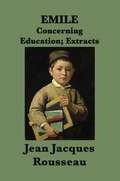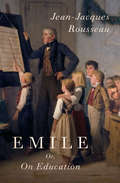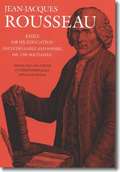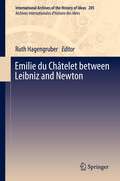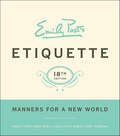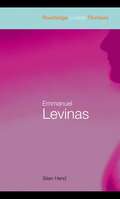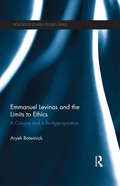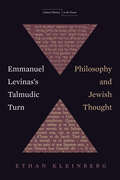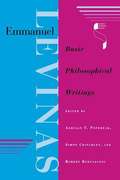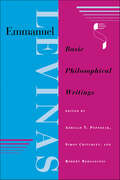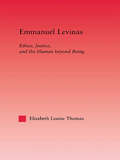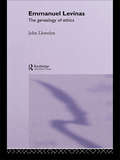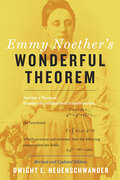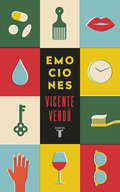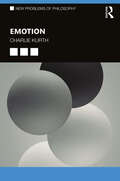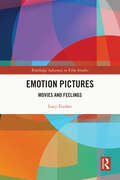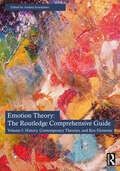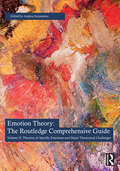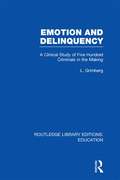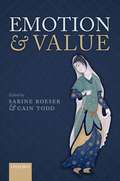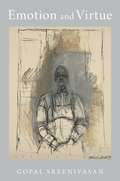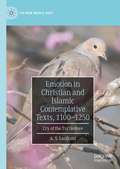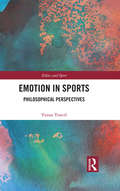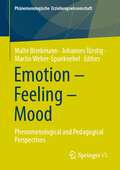- Table View
- List View
Emile or Concerning Education
by Jean Jacques Rousseauémile, or On Education is a treatise on the nature of education and on the nature of man written by Jean-Jacques Rousseau, who considered it to be the "best and most important of all my writings." Due to a section of the book entitled "Profession of Faith of the Savoyard Vicar," émile was banned in Paris and Geneva and was publicly burned in 1762. During the French Revolution, émile served as the inspiration for what became a new national system of education.
Emile: Or On Education
by Jean-Jacques Rousseau Barbara FoxleyThe once banned and burned treatise on the nature of education from the eighteenth-century philosopher and author of The Social Contract. Considered by Jean-Jacques Rousseau himself to be the &“best and most important&” of all his writings, Émile set off a firestorm when it was first published in 1762. It was banned in Paris and burned in Geneva, but later served as the inspiration for a new national system of education during the French Revolution. In its pages, Émile and his tutor embark on a scholarly journey through the boy&’s upbringing. The book also follows the character of Sophie, commenting on the role of women in society. &“More a tract upon education with the appearance of a story than it is a novel, the book describes the ideal education which prepares Émile and Sophie for their eventual marriage&” (The Roots of Educational Theory). &“Jean-Jacques Rousseau&’s Émile or Treatise on Education remains relevant today. The theories and beliefs of Enlightenment philosophers such as Rousseau played a big role in shaping the beliefs of the public at the time, particularly when they were able to distribute their ideas on paper. Without written documents such as this one, it would be impossible to understand their impact on society and, more broadly, on how the idea of nature-based gender and separated spheres have evolved to what they are today.&” —Towards Emancipation?
Emile: The Collected Writings of Rousseau Vol. 13
by Jean-Jacques Rousseau Christopher Kelly Allan BloomThe acclaimed series The Collected Writings of Jean-Jacques Rousseau concludes with a volume centering on Emile (1762), which Rousseau called his "greatest and best book. " Here Rousseau enters into critical engagement with thinkers such as Locke and Plato, giving his most comprehensive account of the relation between happiness and citizenship, teachers and students, and men and women. In this volume Christopher Kelly presents Allan Bloom's translation, newly edited and cross-referenced to match the series. The volume also contains the first-ever translation of the first draft of Emile, the "Favre Manuscript," and a new translation of Emile and Sophie, or the Solitaries. The Collected Writings of Rousseau Roger D. Masters and Christopher Kelly, series editors 1. Rousseau, Judge of Jean-Jacques: Dialogues 2. Discourse on the Sciences and Arts (First Discourse) and Polemics 3. Discourse on the Origins of Inequality (Second Discourse) Polemics, and Political Economy 4. Social Contract, Discourse on the Virtue Most Necessary for a Hero, Political Fragments, and Geneva Manuscript 5. The Confessions and Correspondence, Including the Letters to Malesherbes 6. Julie, or the New Heloise: Letters of Two Lovers Who Live in a Small Town at the Foot of the Alps 7. Essay on the Origin of Languages and Writings Related to Music 8. The Reveries of the Solitary Walker, Botanical Writings, and Letter to Franqui#65533;res 9. Letter to Beaumont, Letters Written from the Mountain 10. Letter to D'Alembert and Writings for the Theater 11. The Plan for Perpetual Peace, On the Government of Poland, and Other Writings on History and Politics 12. Autobiographical, Scientific, Religious, Moral, and Literary Writings 13. Emile or On Education (Includes Emile and Sophie; or The Solitaries)
Emilie du Châtelet between Leibniz and Newton
by Ruth HagengruberEmilie du Châtelet was one of the most influential woman philosophers of the Enlightenment. Her writings on natural philosophy, physics, and mechanics had a decisive impact on important scientific debates of the 18th century. Particularly, she took an innovative and outstanding position in the controversy between Newton and Leibniz, one of the fundamental scientific discourses of that time. The contributions in this volume focus on this "Leibnitian turn". They analyze the nature and motivation of Emilie du Châtelet's synthesis of Newtonian and Leibnitian philosophy. Apart from the Institutions Physiques they deal with Emilie du Châtelet's annotated translation of Isaac Newton's Principia. The chapters presented here collectively demonstrate that her work was an essential contribution to the mediation between empiricist and rationalist positions in the history of science.
Emily Post's Etiquette: Manners for a New World
by Peggy Post Anna Post Lizzie Post Daniel Post SenningIn this completely updated 18th Edition of the classic Emily Post’s Etiquette, the mantle is picked up by the great-great-grandchildren of the First Lady of Etiquette, who tackle the latest issues and demands of the twenty-first century—from texting and tweeting to iPhones, Facebook, and all forms of social media. Millions of Readers, Eighteen Editions, One Trusted ResourceFrom social networking to social graces, the name Emily Post has been the definitive source on etiquette for generations of Americans. That tradition continues with the 18th edition of Etiquette, which welcomes a new generation of Posts—Anna Post, Lizzie Post, and Daniel Post Senning—the great-great grandchildren of Emily Post. Led by Peggy Post, author of the 16th and 17th editions of Etiquette, this team shows how twenty-first-century manners are a combination of kindness, confidence, and awareness.New trends, topics, and societal hot zones include:When is it okay to “unfriend” someone on Facebook?If I’m in a middle seat on an airplane, do I automatically get both armrests?A business client is sick with a cold—am I obligated to shake his hand?Is it rude for guests to tweet from a wedding?Do I have to buy a gift if I attend a destination wedding?Can I email a condolence note?Should I cover up my tattoo for a job interview?The Posts don’t stint on classic conundrums, either. Emily Post’s Etiquette includes advice on names and titles, dress codes, invitations, table manners, workplace frustrations, and weddings.According to the Posts, though times have changed, the principles of good manners remain constant. Above all, manners are a sensitive awareness of the feelings of others. Being considerate, respectful, and honest is more important than knowing which fork to use. Whether it’s a handshake or a fist bump, it’s the underlying sincerity and good intentions of the action that matter most.
Emmanuel Levinas (Routledge Critical Thinkers)
by Seán HandBest known for his theories of ethics and responsibility, Emmanuel Levinas was one of the most profound and influential thinkers of the last century. In this clear, accessible guide, Seán Hand examines why Levinas is increasingly fundamental to the study of literature and culture today. Exploring the intellectual and social contexts of his work and the events that shaped it, Hand considers: the influence of phenomenology and Judaism on Levinas’s thought key concepts such as the ‘face’, the ‘other’, ethical consciousness and responsibility Levinas’s work on aesthetics the relationship of philosophy and religion in his writings the interaction of his work with historical discussions his often complex relationships with other theorists and theories Emmanuel Levinas’s unique contribution to theory set an exemplary standard for all subsequent thought. This outstanding guide to his work will prove invaluable to scholars and students across a wide range of disciplines - from philosophy and literary criticism through to international relations and the creative arts.
Emmanuel Levinas and the Limits to Ethics: A Critique and a Re-Appropriation (Routledge Jewish Studies Series)
by Aryeh BotwinickEmanuel Levinas and the Limits to Ethics highlights how radically different Jewish ethics is from Christian ethics, and the profound affinities that subsist between Jewish ethics and philosophical and political liberalism. The philosophy of Emmanuel Levinas has captured the imagination of a global constituency who take his absolutizing of ethical demands and his assigning primacy to ethics over all other branches of inquiry in his mapping of Western philosophy to be indicative of a major re-ordering of both personal and cultural identity. It is this re-ordering, they believe, that would restore greater wholeness and value to human life. In this book, Aryeh Botwinick takes issue with both the theoretical analysis that Levinas engages in, and the practical ethical import that he draws from it. Arguing that what Levinas has to say about both skepticism and negative theology can be used to re-route his argument away from the avowed aims of his thought, this book will be of great interest to students and scholars of Jewish Studies, Ethics and Philosophy.
Emmanuel Levinas and the Politics of Non-Violence
by Victoria Tahmasebi-BirganiFrench philosopher and Talmudic commentator Emmanuel Levinas (1906-1995) has received considerable attention for his influence on philosophical and religious thought. In this book, Victoria Tahmasebi-Birgani provides the first examination of the applicability of Emmanuel Levinas' work to social and political movements. Investigating his ethics of responsibility and his critique of the Western liberal imagination, Tahmasebi-Birgani advances the moral, political, and philosophical debates on the radical implications of Levinas' work.Emmanuel Levinas and the Politics of Non-Violence is the first book to closely consider the affinity between Levinas' ethical vision and Mohandas Gandhi's radical yet non-violent political struggle. Situating Levinas' insights within a transnational, transcontinental, and global framework, Tahmasebi-Birgani highlights Levinas' continued relevance in an age in which violence is so often resorted to in the name of "justice" and "freedom."
Emmanuel Levinas's Talmudic Turn: Philosophy and Jewish Thought (Cultural Memory in the Present)
by Ethan KleinbergIn this rich intellectual history of the French-Jewish philosopher Emmanuel Levinas's Talmudic lectures in Paris, Ethan Kleinberg addresses Levinas's Jewish life and its relation to his philosophical writings while making an argument for the role and importance of Levinas's Talmudic lessons. Pairing each chapter with a related Talmudic lecture, Kleinberg uses the distinction Levinas presents between "God on Our Side" and "God on God's Side" to provide two discrete and at times conflicting approaches to Levinas's Talmudic readings. One is historically situated and argued from "our side" while the other uses Levinas's Talmudic readings themselves to approach the issues as timeless and derived from "God on God's own side." Bringing the two approaches together, Kleinberg asks whether the ethical message and moral urgency of Levinas's Talmudic lectures can be extended beyond the texts and beliefs of a chosen people, religion, or even the seemingly primary unit of the self. Touching on Western philosophy, French Enlightenment universalism, and the Lithuanian Talmudic tradition, Kleinberg provides readers with a boundary-pushing investigation into the origins, influences, and causes of Levinas's turn to and use of Talmud.
Emmanuel Levinas: Basic Philosophical Writings
by Simon Critchley Robert Bernasconi Adriaan T. PeperzakEmmanuel Levinas (1906-1996) has exerted a profound influence on 20th-century continental philosophy. This anthology, including Levinas's key philosophical texts over a period of more than forty years, provides an ideal introduction to his thought and offers insights into his most innovative ideas. Five of the ten essays presented here appear in English for the first time. An introduction by Adriaan Peperzak outlines Levinas's philosophical development and the basic themes of his writings. Each essay is accompanied by a brief introduction and notes. This collection is an ideal text for students of philosophy concerned with understanding and assessing the work of this major philosopher.
Emmanuel Levinas: Basic Philosophical Writings (Studies in Continental Thought)
by Adriaan T. Peperzak, Simon Critchley, and Robert BernasconiEmmanuel Levinas (1906–1996) has exerted a profound influence on 20th-century continental philosophy. This anthology, including Levinas's key philosophical texts over a period of more than forty years, provides an ideal introduction to his thought and offers insights into his most innovative ideas. Five of the ten essays presented here appear in English for the first time. An introduction by Adriaan Peperzak outlines Levinas's philosophical development and the basic themes of his writings. Each essay is accompanied by a brief introduction and notes. This collection is an ideal text for students of philosophy concerned with understanding and assessing the work of this major philosopher.
Emmanuel Levinas: Ethics, Justice, and the Human Beyond Being
by Lis ThomasThis book explores Levinas's rethinking of the meaning of ethics, justice and the human from a position that affirms but goes beyond the anti-humanist philosophy of the twentieth century
Emmanuel Levinas: The Genealogy of Ethics (Warwick Studies in European Philosophy)
by John LlewelynFirst Published in 2004. Routledge is an imprint of Taylor & Francis, an informa company.
Emmy Noether's Wonderful Theorem
by Dwight E. NeuenschwanderOne of the most important—and beautiful—mathematical solutions ever devised, Noether’s theorem touches on every aspect of physics."In the judgment of the most competent living mathematicians, Fräulein Noether was the most significant creative mathematical genius thus far produced since the higher education of women began."—Albert EinsteinThe year was 1915, and the young mathematician Emmy Noether had just settled into Göttingen University when Albert Einstein visited to lecture on his nearly finished general theory of relativity. Two leading mathematicians of the day, David Hilbert and Felix Klein, dug into the new theory with gusto, but had difficulty reconciling it with what was known about the conservation of energy. Knowing of her expertise in invariance theory, they requested Noether’s help. To solve the problem, she developed a novel theorem, applicable across all of physics, which relates conservation laws to continuous symmetries—one of the most important pieces of mathematical reasoning ever developed.Noether’s "first" and "second" theorem was published in 1918. The first theorem relates symmetries under global spacetime transformations to the conservation of energy and momentum, and symmetry under global gauge transformations to charge conservation. In continuum mechanics and field theories, these conservation laws are expressed as equations of continuity. The second theorem, an extension of the first, allows transformations with local gauge invariance, and the equations of continuity acquire the covariant derivative characteristic of coupled matter-field systems. General relativity, it turns out, exhibits local gauge invariance. Noether’s theorem also laid the foundation for later generations to apply local gauge invariance to theories of elementary particle interactions. In Dwight E. Neuenschwander’s new edition of Emmy Noether’s Wonderful Theorem, readers will encounter an updated explanation of Noether’s "first" theorem. The discussion of local gauge invariance has been expanded into a detailed presentation of the motivation, proof, and applications of the "second" theorem, including Noether’s resolution of concerns about general relativity. Other refinements in the new edition include an enlarged biography of Emmy Noether’s life and work, parallels drawn between the present approach and Noether’s original 1918 paper, and a summary of the logic behind Noether’s theorem.
Emociones
by Vicente VerdúUn libro que vibra con toda la sensibilidad, la ironía y la inteligencia que caracterizaban a Vicente Verdú. En este brillante ejercicio literario y filosófico, Vicente Verdú se dedicó a contemplar con detenimiento los espacios, objetos y pequeños instantes que forman parte de nuestra vida cotidiana: las sábanas, el sexo, el momento de despertar, la atracción del parecido, los lunes, la memoria, la mentira... Aparentemente intrascendentes, se vuelven evocadores y emocionantes, y revelan la personalidad del artista y su lúcida e irónica mirada sobre el mundo. Emociones es un libro que nos hace sentir como en casa. La crítica ha dicho:«Verdú era un renacentista moderno que desde el Mediterráneo se trajo a la meseta un modo insólito de interpretar la realidad. Siempre dio muestras radicales de su compromiso con la modernidad, en los cuadros y en los artículos o en los libros.»Juan Cruz, El País
Emotion (New Problems of Philosophy)
by Charlie KurthEmotions have long been of interest to philosophers and have deep historical roots going back to the Ancients. They have also become one of the most exciting areas of current research in philosophy, the cognitive sciences, and beyond. In this book, Charlie Kurth explains the philosophy of the emotions, structuring the book around seven fundamental questions: What are emotions? Are emotions natural kinds? Do animals have emotions? Are emotions epistemically valuable? Are emotions the foundation for value and morality? Are emotions the basis for responsibility? Do emotions make us better people? In the course of exploring these questions, he also discusses cutting-edge empirical research on emotion, feminist approaches to emotions and their value, and methodological questions on how to theorize about the emotions. The book also contains in-depth discussions of specific emotions like compassion, disgust, anxiety, and curiosity. It also highlights emerging trends in emotion research. Including suggestions for further reading and a glossary of key terms, Emotion is ideal for those studying and researching the philosophy of emotion as well as ethics, epistemology, and the philosophies of mind and psychology.
Emotion Pictures: Movies and Feelings (Routledge Advances in Film Studies)
by Lucy FischerThis book investigates a group of exceptional films that single-mindedly consider one particular emotion – be it pity, lust, grief, or anxiety – to examine cinematic emotion in depth. Drawing on philosophical and psychological approaches, Fischer’s unique analysis offers unparalleled case studies for comprehending emotion in the movies. The book provides the reader with an opportunity to contemplate what notion of a particular emotion is advanced onscreen; to describe how the unique tools and aesthetics of cinema are utilized to do so; to place such representations in dialogue with film theory as well as philosophical and psychological commentary; and to illustrate the important dichotomy between filmic portrayals and audience response. Beyond film and media scholars and students, this book will have resonance for academics and practitioners in several fields of psychology, including social work, psychiatry, and therapy.
Emotion Theory: Volume I: History, Contemporary Theories, and Key Elements (Routledge Handbooks in Philosophy)
by Andrea ScarantinoEmotion Theory: The Routledge Comprehensive Guide is the first interdisciplinary reference resource which authoritatively takes stock of the progress made both in the philosophy of emotions and in affective science from Ancient Greece to today. A two-volume landmark publication, it provides an overview of emotion theory unrivaled in terms of its comprehensiveness, accessibility and systematicity.Comprising 62 chapters by 101 leading emotion theorists in philosophy, classics, psychology, biology, psychiatry, neuroscience and sociology, the collection is organized as follows:Volume I: Part I: History of Emotion Theory (10 chapters) Part II: Contemporary Theories of Emotions (10 chapters) Part III: The Elements of Emotion Theory (7 chapters) Volume II: Part IV: Nature and Functions of 35 Specific Emotions (22 chapters) Part V: Challenges Facing Emotion Theory (13 chapters) Special Elicitors of Emotions Emotions and Their Relations to Other Elements of Mental Architecture Emotions in Children, Animals and Groups Normative Aspects of Emotions Most of the major themes of contemporary emotion theory are covered in their historical, philosophical, and scientific dimensions. This collection will be essential reading for students and researchers in philosophy, psychology, neuroscience, sociology, anthropology, political science, and history for decades to come.
Emotion Theory: Volume II: Theories of Specific Emotions and Major Theoretical Challenges
by Andrea ScarantinoEmotion Theory: The Routledge Comprehensive Guide is the first interdisciplinary reference resource which authoritatively takes stock of the progress made both in the philosophy of emotions and in the affective sciences from Ancient Greece to today. A two-volume landmark publication, it provides an overview of emotion theory unrivaled in terms of its comprehensiveness, accessibility and systematicity.Comprising 62 chapters by 101 leading emotion theorists in philosophy, classics, psychology, biology, psychiatry, neuroscience and sociology, the collection is organized as follows:Volume I:Part I: History of Emotion Theory (10 chapters)Part II: Contemporary Theories of Emotions (10 chapters)Part III: The Elements of Emotion Theory (7 chapters)Volume II:Part IV: Nature and Functions of 35 Specific Emotions (22 chapters)Part V: Major Challenges Facing Emotion Theory (13 chapters) Special Elicitors of Emotions Emotions and Their Relations to Other Elements of Mental Architecture Emotions in Children, Animals, and Groups Normative Aspects of Emotions Most of the major themes of contemporary emotion theory are covered in their historical, philosophical, and scientific dimensions. This collection will be essential reading for students and researchers in philosophy, psychology, neuroscience, sociology, anthropology, political science, and history for decades to come.
Emotion and Delinquency: A Clinical Study of Five Hundred Criminals in the Making (Routledge Library Editions: Education)
by L GrimbergInevitably a product of the time in which it was published this book discusses important questions of neuro-psychology as well as setting out the early ‘nature versus nurture’ debate. The author also argues for changes in the care and education of those with learning difficulties to enable them to lead fulfilling lives, rather than being incarcerated in institutions (as was routinely the case in 1928).
Emotion and Value
by Sabine Roeser Cain ToddThis volume brings together new work by leading philosophers on the topics of emotion and value, and explores issues at their intersection.
Emotion and Virtue
by Gopal SreenivasanA novel approach to the crucial role emotion plays in virtuous actionWhat must a person be like to possess a virtue in full measure? What sort of psychological constitution does one need to be an exemplar of compassion, say, or of courage? Focusing on these two examples, Emotion and Virtue ingeniously argues that certain emotion traits play an indispensable role in virtue. With exemplars of compassion, for instance, this role is played by a modified sympathy trait, which is central to enabling these exemplars to be reliably correct judges of the compassionate thing to do in various practical situations. Indeed, according to Gopal Sreenivasan, the virtue of compassion is, in a sense, a modified sympathy trait, just as courage is a modified fear trait.While he upholds the traditional definition of virtue as a species of character trait, Sreenivasan discards other traditional precepts. For example, he rejects the unity of the virtues and raises new questions about when virtue should be taught. Unlike orthodox virtue ethics, moreover, his account does not aspire to rival consequentialism and deontology. Instead Sreenivasan repudiates the ambitions of virtue imperialism.Emotion and Virtue makes significant contributions to moral psychology and the theory of virtue alike.
Emotion in Christian and Islamic Contemplative Texts, 1100–1250: Cry of the Turtledove (The New Middle Ages)
by A. S. LazikaniThis book offers a comparative study of emotion in Arabic Islamic and English Christian contemplative texts, c. 1110-1250, contributing to the emerging interest in ‘globalization’ in medieval studies. A.S.Lazikani argues for the necessity of placing medieval English devotional texts in a more global context and seeks to modify influential narratives on the ‘history of emotions’ to enable this more wide-ranging critical outlook. Across eight chapters, the book examines the dialogic encounters generated by comparative readings of Muhyddin Ibn ‘Arabi (1165-1240), ‘Umar Ibn al-Fārid (1181-1235), Abu al-Hasan al-Shushtarī (d. 1269), Ancrene Wisse (c. 1225), and the Wooing Group (c. 1225). Investigating the two-fold ‘paradigms of love’ in the figure of Jesus and in the image of the heart, the (dis)embodied language of affect, and the affective semiotics of absence and secrecy, Lazikani demonstrates an interconnection between the religious traditions of early Christianity and Islam.
Emotion in Sports: Philosophical Perspectives (Ethics and Sport)
by Yunus TuncelEmotion is central to human character, infiltrating our physiological functions and our mental constitution. In sport, athletes feel emotion in specific ways, from joy to anger and despair. This is the first book to examine emotion in sport from a philosophical perspective, building on concepts developed by ancient Greek and modern philosophers. For instance, how is Aristotle’s concept of catharsis applied to the sports field? How about power as advanced by Nietzsche, or existentialism as discussed by Kierkegaard? Emotion in Sports explores the philosophical framework for the expression of emotion and relates it to our psychological understanding, from the perspective of both athlete and spectator. A fascinating and useful read for students, researchers, scholars, and practitioners in the fields of sport sciences, philosophy, and psychology.
Emotion – Feeling – Mood: Phenomenological and Pedagogical Perspectives (Phänomenologische Erziehungswissenschaft #12)
by Malte Brinkmann Johannes Türstig Martin Weber-SpanknebelThis volume provides systematic, interdisciplinary, and intercultural impulses for a phenomenological pedagogy of emotions, feelings, and moods without subordinating them to the logocentric dualism of emotion and rationality. Starting from foundational and cultural perspectives on pedagogical relations of education, learning, and Bildung, specific emotions in individual studies, as well as different approaches of important representatives of phenomenological research on emotions are presented. The contributions include pedagogical, philosophical, and empirical approaches to feelings, emotions, and moods, highlighting their fundamental importance and productivity for learning, Bildung, and education in different pedagogical institutions and fields.
